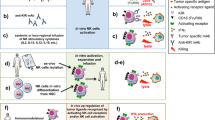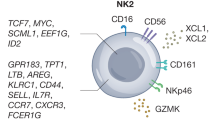Abstract
Natural killer (NK) cells are cytotoxic against a variety of transformed and virus-infected cells. Cytotoxicity of NK cells is regulated through complex interactions between receptors expressed on NK surface and their cognate ligands expressed on the surface of target cells. A large body of data supports the concept that NK are key players of immune surveillance against cancer, and NK cell based immunotherapy has been proved to be feasible and effective. Allogeneic NK cell infusion, in nontransplant recipients with malignant disorders, is associated with a modest but of a short-term duration antitumor effect. The major limitation of allogeneic-NK therapy is the inevitable rejection of allogeneic effectors and the termination of antitumor activity. Allogeneic NK cells are not rejected by the host if infused after stem cell transplantation from the same donor. Although the existing data are limited, allogeneic-NK immunotherapy is much more effective if performed after haploidentical stem cell transplantation. Future trials should address this issue.
Similar content being viewed by others
References
Whiteside TL, Herberman RB. The role of natural killer cells in immune surveillance of cancer. Curr Opin Immunol. 1995;7:704–10.
Orange JS. Human natural killer cell deficiencies. Curr Opin Allergy Clin Immunol. 2006;6:399–409.
Etzioni A, Eidenschenk C, Katz R, Beck R, Casanova JL, Pollack S. Fatal varicella associated with selective natural killer cell deficiency. J Pediatr. 2005;146:423–5.
Lanier LL. NK cell receptors. Annu Rev lmmunol. 1998;16:359–93.
Tsirigotis PD, Resnick IB, Shapira MY. The role of natural killer cells in hematopoietic stem cell transplantation. Ann Med. 2012;44(2):130–45.
Rosenberg SA, Lotze MT, Muul LM, et al. Observations on the systemic administration of autologous lymphokine-activated killer cells and recombinant interleukin-2 to patients with metastatic cancer. N Engl J Med. 1985;313:1485–92.
Law TM, Motzer RJ, Mazumdar M, et al. Phase III randomized trial of interleukin-2 with or without lymphokine-activated killer cells in the treatment of patients with advanced renal cell carcinoma. Cancer. 1995;76:824–32.
Leemhuis T, Wells S, Scheffold C, Edinger M, Negrin RS. A phase I trial of autologous cytokine-induced killer cells for the treatment of relapsed Hodgkin disease and non-Hodgkin lymphoma. Biol Blood Marrow Transpl. 2005;11:181–7.
Torelli GF, Guarini A, Palmieri G, et al. Expansion of cytotoxic effectors with lytic activity against autologous blasts from acute myeloid leukaemia patients in complete haematological remission. Br J Haematol. 2002;116:299–307.
Lowdell MW, Craston R, Samuel D, et al. Evidence that continued remission in patients treated for acute leukaemia is dependent upon autologous natural killer cells. Br J Haematol. 2002;117(4):821–7.
Ruggeri L, Capanni M, Urbani E, et al. Effectiveness of donor natural killer cell alloreactivity in mismatched hematopoietic transplants. Science. 2002;295:2097–100.
Ruggeri L, Capanni M, Casucci M, et al. Role of natural killer cell alloreactivity in HLA-mismatched hematopoietic stem cell transplantation. Blood. 1999;94:333–9.
Miller JS, Soignier Y, Panoskaltsis-Mortari A, et al. Successful adoptive transfer and in vivo expansion of human haploidentical NK cells in patients with cancer. Blood. 2005;105:3051–7.
Curti A, Ruggeri L, D’Addio A, et al. Successful transfer of alloreactive haploidentical KIR ligand-mismatched natural killer cells after infusion in elderly high risk acute myeloid leukemia patients. Blood. 2011;118:3273–9.
Cooley S, Foley B, Verneris MR, et al. Haploidentical natural killer (NK) cells expanding in vivo after adoptive transfer exhibit hyperfunction that partially overcomes self tolerance and leads to clearance of refractory leukemia. Blood. 2011;118 (Abstract 355).
Slavin S, Ackerstein A, Or R, et al. Immunotherapy in high-risk chemotherapy-resistant patients with metastatic solid tumors and hematological malignancies using intentionally mismatched donor lymphocytes activated with rIL-2: a phase I study. Cancer Immunol Immunother. 2010;59:1511–9.
Slavin S, Or R, Aker M, et al. Treatment of resistant leukemia by rIL-2 activated NK cells in recipients of HLA matched and haploidentically mismatched stem cell allografts while avoiding GVHD. Blood. 2004;104:379 (Abstract 5180).
Passweg JR, Tichelli A, Meyer-Monard S, et al. Purified donor NK-lymphocyte infusion to consolidate engraftment after haploidentical stem cell transplantation. Leukemia. 2004;18:1835–8.
Koehl U, Sörensen J, Esser R, et al. IL-2 activated NK cell immunotherapy of three children after haploidentical stem cell transplantation. Blood Cells Mol Dis. 2004;33:261–6.
Laport G, Sheehan K, Baker J et al. Adoptive immunotherapy with cytokine-induced killer cells for patients with relapsed hematologic malignancies after allogeneic hematopoietic cell transplantation. Biol Blood Marrow Transplant. 2011;17:1679–87.
Conflict of interest
The authors declare that there is no actual or potential conflict of interest in relation to this article.
Author information
Authors and Affiliations
Corresponding author
Rights and permissions
About this article
Cite this article
Tsirigotis, P., Papanikolaou, N. Natural killer cell based immunotherapy for eradication of minimal residual disease in patients with malignant disorders. memo 5, 98–100 (2012). https://doi.org/10.1007/s12254-012-0010-7
Received:
Accepted:
Published:
Issue Date:
DOI: https://doi.org/10.1007/s12254-012-0010-7




